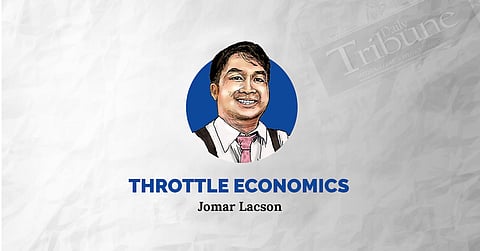
- NEWS
- the EDIT
- COMMENTARY
- BUSINESS
- LIFE
- SHOW
- ACTION
- GLOBAL GOALS
- SNAPS
- DYARYO TIRADA
- MORE

In economics, there is an assumption that consumers have monotonic preferences, or monotonicity for short.
While that may sound very technical, what it truly means is that consumers or people prefer more of a good than less of it. If you are given a choice of owning one car or two cars, you will always choose two cars, all things being equal.
The desire for more drives us to seek growth. In addition, growth is a good thing. We work harder, we try to innovate, we spend or save more, and we try to live life to the fullest. Nothing wrong with that.
Another assumption in economics is that there are constraints. This is what makes choices difficult. As the saying goes, we cannot have our cake and eat it too.
The Bureau of the Treasury (BTr) reported that our fiscal deficit for June was P241.6 billion. This meant that for the first half, our total fiscal deficit was P765.5 billion, and we are on our way to matching our 2024 deficit of P1.5 trillion.
Deficits basically say that we are spending more than what we earn. In addition, like any household, that means we have to borrow or get a new job that pays more. In national terms, we may incur debt, or we may try to export more.
Ever since the Covid-19 pandemic, we have covered our overspending with debt both externally and domestically. Mind you, this is normal and bigger countries such as the US have much larger debt exposures than us.
Our overspending deficit is partly due to the debt we incurred to manage the Covid-19 health crisis. Moreover, as we incur more debt to fund the deficit, the interest we are paying is compounding. At these levels, it is still manageable. However, its growth cannot continue forever.
This is the cake (spend) that we have, but we cannot eat it (free) as well. The government needs to reduce our debt service costs or reduce spending. The latter is tougher, considering that we need to spend on our economic growth requirements.
Part of the solution is to reduce interest rates. The Bangko Sentral ng Pilipinas (BSP) is already cutting rates, and this will help. The idea is for growth to be driven more by the private sector. Low interest rates are expected to increase the appetite for investment spending.
However, the other part of it is that the government needs to earn more. There are two issues here. One is tax exemptions and the other is tariffs. In December 2024, the proliferation of fake persons with disability (PWD) cards was reported to have cost the government P88 billion in 2023. A more conscientious consumer could have helped generate savings for the government by not using fake PWD cards.
While you think you may be saving by receiving the 20-percent discount, a wider deficit will ultimately return to you in the form of weaker economic growth, inflation, and high interest rates. Again, another cake or lunch that cannot be free.
The last issue is tariffs. The US and the Philippines struck a deal where US imports from the Philippines are charged a 19-percent tariff, whereas US exports to the Philippines are not charged tariffs. As a non-tax revenue, this zero-tariff regime on US imports contributes to weaker GDP growth and lower revenues for the Philippine government. How much tariffs we collect from US imports is unknown, so the deal’s impact on the deficit is also unknown. However, every peso counts.
It is difficult to ask consumers to deny their monotonic preferences. We want more, and it is perfectly normal to do so. However, given the size of our fiscal deficit and the implications for our debt positioning, we need to understand that seeking more today can result in having less tomorrow.
